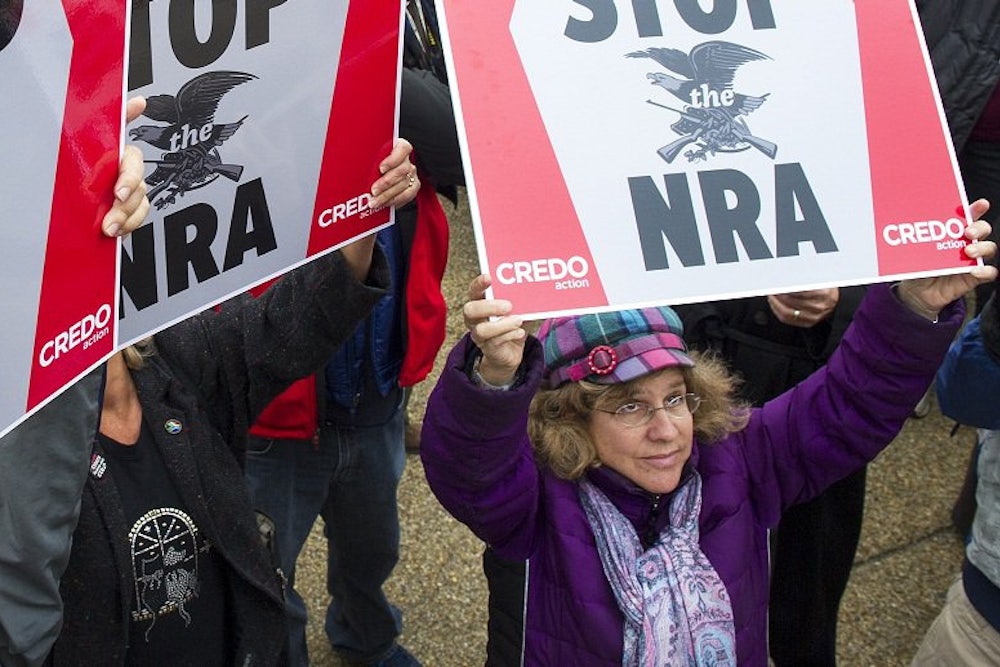I’m relatively agnostic about gun control. I’m from the West; I have friends who really like their guns. And I live in the East; I have friends who really hate guns. But it should be troubling to partisans of all stripes when terrible political analysis dictates public policy. Unfortunately, that’s exactly what’s happened with gun control. This week, the Manchin-Toomey amendment requiring background checks on gun purchases failed in the Senate, in part—perhaps in large part—because senators bought into the myth of an omnipotent National Rifle Association. The good news for gun control advocates is that the myth could break in 2016.
It might seem that only an omnipotent villain could defeat a measure supported by 90 percent of Americans, but don’t blame the NRA. Mayor Michael Bloomberg’s “Mayors Against Illegal Guns” outspent the NRA on the airwaves by a wide margin. Indeed, Bloomberg spent as much on advertisements over the last month as the NRA spent opposing Democrats in the entire 2012 election cycle. Of course, that doesn’t say very much, since the NRA only spent a total of $17 million in 2012’s presidential and congressional contests, and the money was spread so thinly across dozens of races that the lobby was largely inconsequential in every contest it entered—and mostly lost.
If it’s not the NRA's money, then it must be the ratings. Jonathan Chait recently wrote that, if he were a red state Democrat, he would have voted against background checks to preserve his "A" rating from the NRA. But real senators with low NRA ratings routinely win Senate elections in culturally conservative states. Bill Nelson has an "F" from the NRA and campaigned on gun control in 2000, yet he always outperforms Democratic presidential candidates in culturally conservative stretches of northern and central Florida. Nelson isn’t the only Democrat succeeding in Dixie with an “F.” He’s joined by Senators Tim Kaine ("F"), Kay Hagan ("F"), Jay Rockefeller ("D"), and Claire McCaskill ("F"). In Ohio, where John Kerry went hunting before the 2004 presidential election, F-rated Sherrod Brown carried much of the southeastern part of the state in 2006 and cleanly won a second term in 2012. Senator Heidi Heitkamp could have peered across North Dakota’s eastern border and noticed F-rated Amy Klobuchar winning rural, conservative, western Minnesota with more than 60 percent of the vote.
This isn’t to say that there aren’t risks to supporting gun control legislation. But background checks? Polls show that every demographic group, including NRA households, support background checks by overwhelming margins. A-rated Senators Jon Tester, Mark Warner, Pat Toomey, and Joe Manchin all voted for Manchin-Toomey. Mark Pryor’s decision to vote against the bill is particularly baffling, since he already had a C-minus rating. I’ll be surprised if C-rated Mary Landrieu’s 2014 post-mortem mentions her vote for Manchin-Toomey, let alone F-rated Kay Hagan’s. How many of these voters are supporting Democratic candidates, anyway? My hunch: not many. Red state Democrats take votes that align them with the national party all the time—often taking far bigger risks than supporting popular legislation that’s unlikely to spur a great backlash among gun owners.
Even if there were meaningful costs to supporting background checks, the NRA’s power is still exaggerated. There’s no credible argument that the NRA has a veto over Democratic fortunes outside of the Acela corridor, which is basically what commentators have implied since gun control was blamed for Al Gore’s collapse in Appalachia. Not that this really made any sense at the time, since President Bill Clinton signed the Brady Bill and the assault weapons ban before winning reelection with big wins in states like West Virginia. Appalachia’s reluctance to return to Democratic presidential candidates since 2000 suggests that these voters have turned toward the GOP for other reasons, or are otherwise lost for good.
The good news for gun control advocates is that the myth could break in 2016. It’s easy to envision the next Democratic presidential candidate campaigning on gun control—and winning. Thirteen years ago, Democrats needed rural Ohio, West Virginia, or Missouri to win the presidency. Today, Democratic presidential candidates are less reliant on rural, conservative gun owners than at any time in the history of the party. Democrats win with big margins in cities and suburbs, where support for gun control is an asset, not a hindrance. This is even true in Ohio, where Obama won twice despite losing additional ground in the traditionally Democratic, gun-toting, southeastern part of the state. Now Republicans find themselves in the place that haunted Democrats in the early part of the last decade: To win, Republicans need to reclaim the socially moderate suburbs around Denver, Washington, and Philadelphia, where gun control is a real asset to Democratic candidates.
Obama could have used gun control in the 2012 presidential election, but it wasn’t necessary: He had already consolidated the well-educated suburbs by the time of the Aurora movie massacre, which gave him an opening. But if well-educated voters are up for grabs in 2016, or if a more prudent Republican denies Democrats more effective wedge issues like Planned Parenthood, Democrats might instead rely on gun control to consolidate their suburban gains. The 2016 presidential primaries and the possibility that Obama will keep the issue alive suggest that the issue will play a major role in 2016. If Democrats campaign on gun control and win, the myth of the NRA’s power may finally fade, allowing innocuous reforms like background checks to become law.
Correction: An earlier version of this article referred to Bill Nelson as Ben Nelson, and Sherrod Brown as Sharrod Brown.
